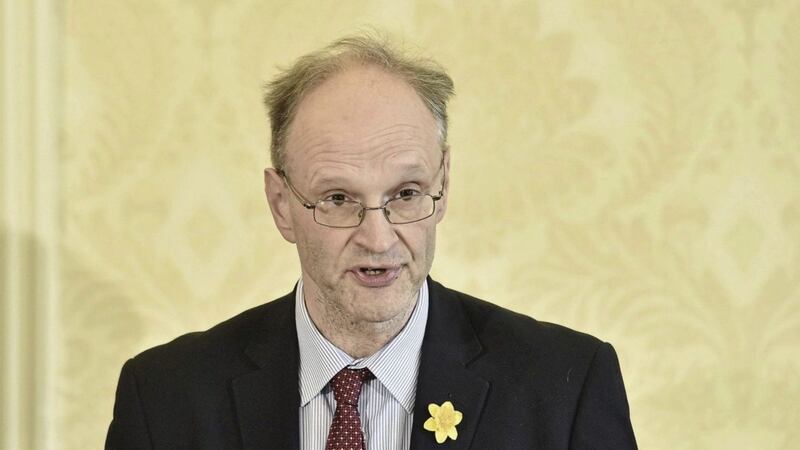School closures are the only coronavirus policy on which there has been any public disagreement among the Stormont executive parties. With the dispute resolved, the fear and rancour it has caused can hopefully be seen in a calmer context.
We have closed our schools at around the same point in the progression of the epidemic as the Republic and perhaps even a few days ahead, according to hospital statistics. So to an extent we have been arguing over nothing. That may not be true along the border, as Tanaiste Simon Coveney noted this week, but schools there have been a small part of any leak. The number of children from the Republic receiving an education in Northern Ireland is 350, with 200 travelling in the opposite direction, according to official 2018 figures. Unofficial totals are estimated to be on the order of hundreds more, not thousands.
School closures are in any case a marginal policy in coping with the epidemic. It is the lack of testing for coronavirus in Northern Ireland that is the worrying difference with the Republic.
**
School closures were announced by first minister Arlene Foster and deputy first minister Michelle O’Neill during a joint statement on Stormont’s wider coronavirus response, which focused mainly on £370 million of assistance for businesses. This includes a three-month rates holiday plus immediate cash grants. More of the same will be forthcoming as the Treasury raises funding but Stormont has a special responsibility to ensure the support helps workers, as employment law is devolved. A lot of people are going to fall through the cracks of the benefits system if they are temporarily laid off without pay, which so far is the default response to the economic shutdown.
**
As noted here last week, teaching unions have spent almost a decade blocking use of Elluminate, a system installed since 2011 in all Northern Ireland’s schools to let ill pupils watch lessons live online.
Many schools are now offering live online learning through other platforms but unions remain concerned about any video element. The NASUWT says lessons could be recorded and edited for inappropriate postings on social media. It wants safeguards and a right for teachers to opt out. This is a genuine issue and while the technical challenge is formidable it must be noted that, unlike most coronavirus problems, the Department of Education has had nine years to fix it.
**
The Orange Order has announced a halt to all activities, including parading, with members told to volunteer for community health efforts instead. With the epidemic projected to peak in 14 weeks this year’s Twelfth is presumably cancelled, along with the entire marching season.
Orange parades were not even cancelled during World War 2, although newsreels did stop covering them to prevent outrage in Britain at so many men failing to volunteer for the military.
The Order wrote to members with its decision the day after a Sunday newspaper published an interview with east Belfast unionist councillor and Orangeman Jim Rodgers, declaring coronavirus would not stop him parading.
Having lost the UUP whip last year over an anti-Alliance election leaflet, the councillor’s social distancing is now complete.
**
Sinn Féin spent most of the time the executive was split on school closures criticising Alliance, although Alliance does not control education and its leader, justice minister Naomi Long, was bedridden with a serious chest infection. Complaints by Sinn Féin representatives and activists were as petty as one toilet in a courthouse being closed for maintenance. Long was eventually chastised into conceding she had argued at the executive a week ago for schools to be closed by yesterday. However, Alliance had accepted the need for collective responsibility on taking scientific advice to keep schools open.
This has all been in sharp contrast to the continued chumminess between Sinn Féin and the DUP. Of course, Sinn Féin has never lost any votes to the DUP.
**
In normal times, this week’s news would have been dominated by a government rethink on Troubles legacy. A new independent body has been proposed to “swiftly” assess the 2,000 unsolved cases, identify those with new evidence and a realistic prospect of prosecution, then pass them on for a full criminal investigation. The remaining cases, making up the vast majority, would never go to court and enter a truth recovery process.
This preserves the structures of the Stormont House legacy proposals, while essentially priming them for their expected outcome. Nobody has ever disputed there will be few new prosecutions. The government’s claim of preventing “vexatious prosecutions” of former solders is rendered meaningless by the requirement for new evidence, as it has been careful to define vexatiousness as prosecution without new evidence.
Sinn Féin put up only a token objection to the latest proposals, strongly suggesting another legacy stitch-up between republicans and the British government.
If so, the people most likely to be getting stitched up are former members of the RUC.









